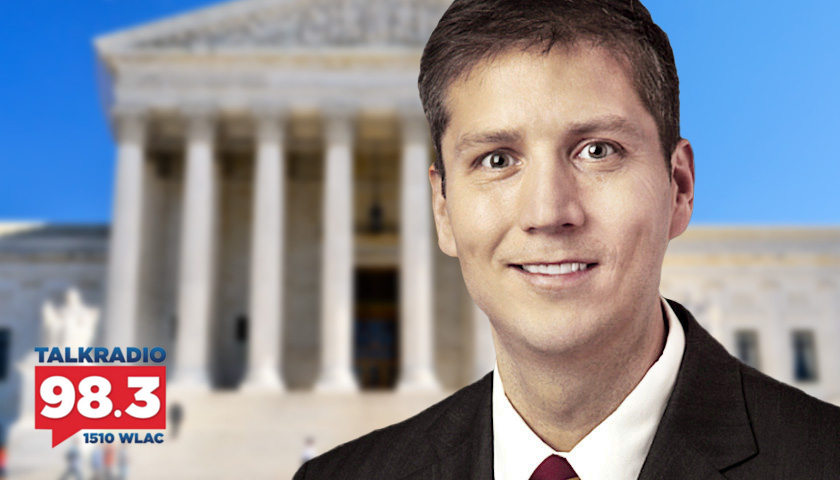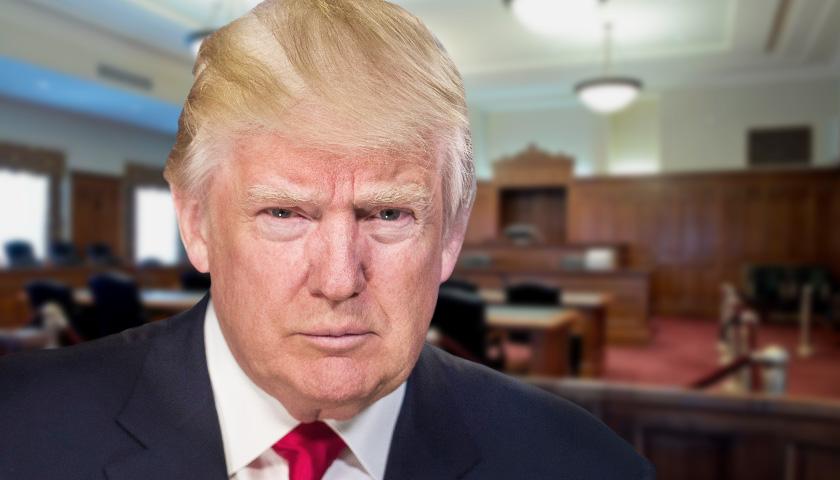Live from Music Row, Friday morning on The Tennessee Star Report with Michael Patrick Leahy – broadcast on Nashville’s Talk Radio 98.3 and 1510 WLAC weekdays from 5:00 a.m. to 8:00 a.m. – host Leahy welcomed attorney Braden Boucek of the Southeastern Legal Foundation in studio to analyze the so-called investigation into the U. S. Supreme Court document leak in response to the Dobbs decision in February 2022.
Leahy: We welcome to our microphones all-star panelist, good friend, and the director of litigation for the Southeastern Legal Foundation, Mr. Braden Boucek. Good morning, Braden.
Boucek: Good morning. Great to be here, and always great to be an all-star panelist.
Leahy: (Chuckles) And sitting in for Crom Carmichael today.
Boucek: No one sits in for Crom. We just keep the chair warm.
Leahy: Keeping Crom’s chair warm.
Boucek: That’s right.
Leahy: Where do we begin, Braden?
Boucek: We don’t begin.
Leahy: There’s just so much to talk about, and it’s so absurd. But I want to start out with this report. I can’t believe it. So the Supreme Court, as you may recall, the Dobbs decision which overturned Roe v. Wade was leaked to the press, and it was stunning back in February.
The final decision, I think, came back in May. Never in the history of the Supreme Court that I know of has a draft decision been leaked to the press.
Boucek: No, I think that’s totally unprecedented.
Leahy: And the Supreme Court…
Boucek: Did they find them?
Leahy: Vowed to get to the bottom of it right.
Boucek: Right.
Leahy: Who did it? And so now, yesterday, the results of that investigation have come out. (Laughs)
Boucek: Are you satisfied?
Leahy: They don’t know who did it.
Boucek: That’s disappointing.
Leahy: Disappointing is a mild term to describe it. And here’s the thing. It doesn’t look like an investigation to me, because let me just say this, Chief Justice Roberts, who, by the way, I think I told you this before. We were classmates at Harvard, but he graduated a year before. We lived in the same dorm.
Boucek: Really? That’s fascinating.
Leahy: Yes. And we lived in the same hallway. He was on the second floor, I was on the fourth floor. And he was a very nice fellow, but he kind of sort of has lost his way as chief justice. (Laughs)
Boucek: This is worse than when he didn’t wear shower shoes tracking toe fungus everywhere?
Leahy: (Chuckles) Anyways, he launched this investigation. He didn’t go to get somebody from the FBI to do it. He brought in a marshal. And what was curious about the investigation is they interviewed 100 people on penalty of perjury that had filled out and asked to answer questions. Guess who they didn’t interview?
Boucek: Who?
Leahy: The other Supreme Court justices.
Boucek: It would seem to me, as a person whose managed investigations before, that those would be persons with relevant knowledge that I would want to take their testimony.
Leahy: But he’s all for collegiality.
Boucek: When you’re elevating collegiality over the integrity of the court and the judicial process.
Leahy: They spent almost a year investigating, and they can’t find who leaked it. Give me a break.
Boucek: No, I know. One thing to bear in mind is that whoever was the leaker is not a career criminal. This is not somebody with a long history of figuring out how to evade law enforcement. This is most likely a lawyer or a clerk or some other white-collar person.
Leahy: Other white-collar person. Let me just say this. There are nine Supreme Court justices.
Boucek: Correct.
Leahy: Not one of them was interviewed.
Boucek: Yes, I think that that’s a big fail. And I read the Marshal’s report.
Leahy: The U.S. Marshal who handles the Supreme Court was one that was given the duty to find out this person. So you read the report?
Boucek: I did read the report. And I’ve read a lot of investigative reports. As a 14-year prosecutor, this did not look like any investigative report I’ve ever read.
Leahy: Did they not investigate anything?
Boucek: It’s not just that they didn’t investigate the way that I was satisfied with, the way they wrote it up, you don’t even really know what they did. It was just conclusory and lots of just telling you that we looked here and didn’t find anything.
But not really telling you much about what they actually said or heard. I’ll give you an example. At one point in time, they said that they found fingerprints on I can’t remember the word, but fingerprints on a relevant item.
Leahy: Okay, what does that mean?
Boucek: But it didn’t turn up any matches with any known suspects. But wouldn’t you love to know what the relevant item was? That’s not how the FBI writes reports or the DEA writes reports.
Leahy: Of course. How would they write the report?
Boucek: They would have said on such and such a date, I acquired this item. Here’s what it was, here’s its exhibit number, and here’s how it came into custody. We did this process. We acquired a fingerprint. It would tell you, actually something not just relate a conclusion.
Leahy: But Braden, this investigation, they put a stamp on it. Michael Chertoff, the first secretary of Homeland Security under George W. Bush, looked at it and put a stamp of approval on it and said this was a good investigation.
Boucek: Is this not the swampiest thing you’ve ever heard of in your life?
Leahy: Chertoff is terrible. In my opinion. Mr. Swamp.
Boucek: But even just the thinking there, of like, well, the investigation didn’t do anything, but everybody will trust it if we put Michael Chertoff’s seal of approval on top of it.
Leahy: Do you get the impression that my former classmate’s intent here, Chief Justice John Roberts, was to make sure that the culprit was not discovered? Do you get that impression?
Boucek: I think the concern is fairly raised. (Leahy laughs) You alluded to it in the intro that the nation’s premier law enforcement entity is mere blocks away, and they decided they’d rather have the investigation led by a bunch of bailiffs.
Leahy: By a bunch of bailiffs. Can I just speculate?
Boucek: Sure.
Leahy: It would seem to me that the failure to interview other Supreme Court justices, (Sotomayor, Kagan), go down the list, indicates that the chief justice did not want to know what those other justices have done.
Boucek: It certainly needlessly circumscribed the scope of the investigation.
Leahy: (Chuckles) You’re a very careful attorney, my friend. (Laughter)
Boucek: I don’t go around taking potshots at judges and take it lightly.
Leahy: That’s a very good point, but that seems to be like a gaping hole in this, what they think this is doing. Do they think this is putting a bow on this?
Boucek: I think that they think that, yes. It should not be over, and House Republicans shouldn’t let it be over, but yes.
Leahy: So there you go. Is this something for the Judiciary Committee to investigate?
Listen to today’s show highlights, including this interview:
– – –
Tune in weekdays from 5:00 – 8:00 a.m. to The Tennessee Star Report with Michael Patrick Leahy on Talk Radio 98.3 FM WLAC 1510. Listen online at iHeart Radio.
Photo “Braden Boucek” by The Federalist Society. Background Photo “Supreme Court” by TexasGOPVote.com. CC BY 2.0.





